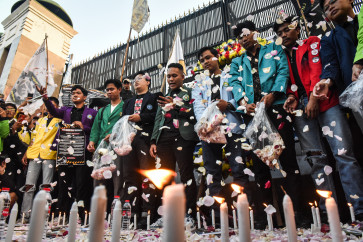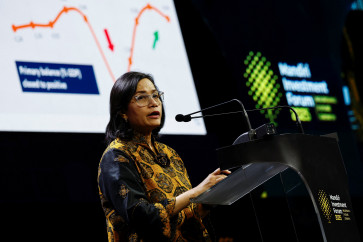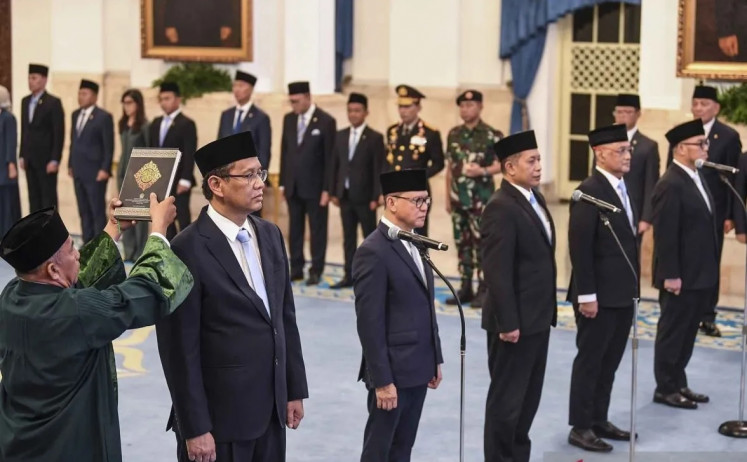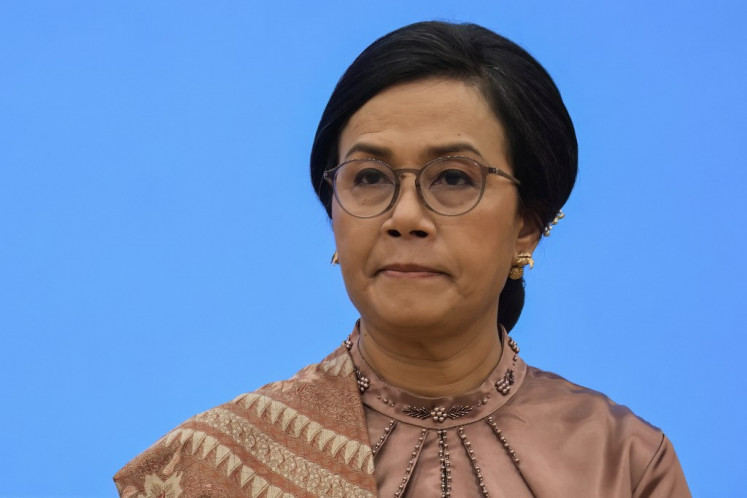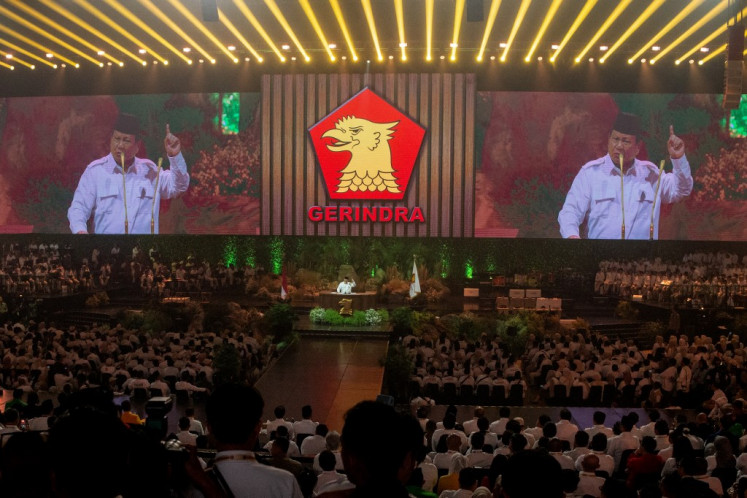Popular Reads
Top Results
Can't find what you're looking for?
View all search resultsPopular Reads
Top Results
Can't find what you're looking for?
View all search resultsActive and vocal, Indonesia has little leverage in Israel-Palestine conflict
Given these religious sentiment, politicians could not resist the temptation to turn the Palestinian question into a domestic political issue.
Change text size
Gift Premium Articles
to Anyone
P
resident Joko “Jokowi” Widodo has donned his diplomatic cap for much of these past two weeks speaking over the phone with a number of other world leaders to find a common ground on how best to respond to the escalating violence in the Israeli-Palestinian conflict.
Besides issuing a condemnation against Israel for its attacks on Palestinians in the Gaza Strip and the occupied West Bank, and appealing for a cease-fire, Jokowi has spoken separately to leaders from Turkey, Malaysia, Singapore, Afghanistan and Brunei on how to help defuse the situation.
He achieved little, however, beyond getting his Malaysian and Bruneian counterparts to jointly issue a statement on Sunday, condemning Israel and calling its actions as a violation of international laws, including humanitarian and human rights law.
More than 200 Palestinians, including 61 children, have been killed since hostilities flared between the Jewish state and armed Palestinian groups in the Gaza Strip last week.
For historical and spiritual reasons, the Palestinian question has always been a major political issue in Indonesia, the country with the largest Muslim population in the world. The issue also often plays into its domestic politics. So it has both international and domestic dimensions.
For this reason, Indonesia has continued to be vocal in criticizing Israel, even though it has little leverage in influencing the course of events in the conflict.
While it supports the two-state solution, Jakarta has stubbornly refused to open diplomatic relations with Israel until after the creation of an independent Palestinian state. There have been entreaties from Tel Aviv and some nudging from the United States to reconsider this position since establishing ties would open a line of communication to give it some leverage on Israel.
Israel prime minister Yitzhak Rabin made an unannounced visit to Jakarta in 1997 to meet with president Soeharto. Foreign minister Hassan Wirajuda met with his Israeli counterparts on two occasions in the first decade of the millennium. President Abdurrahman “Gus Dur” Wahid when he came to office in 1999 proposed to establish formal trade ties with Israel, but abandoned the idea as soon as it became clear that there was little public support.
Talks of the possibility of opening ties with Israel surfaced last year after the visit to the US by Coordinating Maritime Affairs and Investment Minister Luhut Pandjaitan. While he returned with the pledge of US$2 billion from Jared Kushner, then-president Donald Trump’s son-in-law and White House senior adviser, to contribute to Indonesia’s newly created sovereign wealth fund, the money apparently came with a condition, that Indonesia must establish ties with Israel. After Trump lost the election in November, so went the pledged fund and any discussion of Israel ties.
As it is, without the diplomatic ties with Israel, Indonesia’s role in the conflict has come down to one of cheering from the sidelines for one side of the conflict.
At the Organization of Islamic Cooperation (OIC) foreign ministers’ meeting held online on Sunday to discuss the Palestinian issue, Indonesia found its voice drowned by the more dominant Arab countries. The OIC came out with a joint statement condemning Israel, but infighting among Muslim countries, particularly between Iran and Saudi Arabia, almost ensured that the 57-nation group could rarely unite on anything, even in dealing with Israel.
The only other diplomatic channel available to Indonesia is the 193-member United Nations’ General Assembly, which has little mandate. Indonesia served as a non-permanent member of the UN Security Council in 2019-2020, but even if it was still a member, the Council has been ineffective in stopping the violence as it got caught up in big power politics. The United States has consistently used its veto rights in the council to stop any resolution criticizing Israel.
In spite of Indonesia’s limitations to play a more active role to help find a solution to the conflict, the Palestinian issue, or more precisely the creation of an independent Palestinian state, has always ranked high among the most important foreign policy issues discussed in the country.
President Jokowi made it his top foreign policy priority when he came to office in 2014, the first president to do so. Early presidents put ties with ASEAN, China, the US, Japan and may be even Europe as more important than the Palestinian issue.
In 2016, Jokowi hosted an extraordinary OIC summit on Palestine. But beyond more statements, the meeting did not lead anything to change the Middle East political map.
There is an important historical reason why the creation of an independent Palestinian state is important to Indonesia. Among the dozens of countries represented in the Asia Africa Conference in Bandung in 1955, all but Palestine has gained their independence. Many African countries took inspiration from the gathering and returned to lead the fight for their independence.
Indonesian Muslims also feel spiritually connected with Palestine as Jerusalem’s Old City hosts Al Aqsa mosque, Islam’s third-holiest site after the two Haram mosques in Mecca and Madinah, both in Saudi Arabia.
Given these religious sentiment, politicians could not resist the temptation to turn the Palestinian question into a domestic political issue. It is one of the safest issues to use since there is little controversy when the majority in the country supporting the Palestinian independence.
Campaigning on the Palestinian issue in election times, as Jokowi and many politicians have done, replenish their Islamic credentials and give them few extra Muslim votes. By doing this, unfortunately they are reinforcing the belief among Indonesians that the Palestinian issue is a conflict between religions, between Judaism and Islam, and not about land, territory and sovereignty.
***
The writer is senior editor of The Jakarta Post. The article was published in the latest edition of Tenggara Backgrounder.


